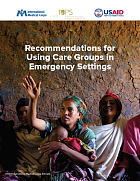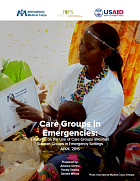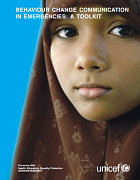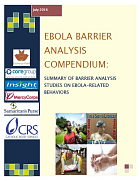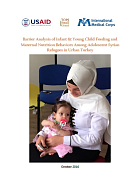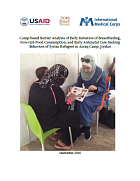Emergencies frequently disrupt people’s ability to practice life-protecting behaviours, such as exclusive breastfeeding (preventing malnutrition) or using oral rehydration salts (treating diarrhoea). Understanding what exactly prevents people from practicing these life-saving behaviours and addressing the main barriers must be an integral part of any emergency response. This site therefore provides the most useful resources on behaviour change in emergencies. Let us know please if you think that an important tool or publication is missing.
SBC Best Practices
2023, ADRA
This insightful report was prepared as part of the Yemen Emergency Multisectoral and Lifesaving Interventions (YEMLI) project that is implemented by ADRA Yemen. The report aims to share the key best practices and lessons learned from ADRA's three years of implementing a multi-sectoral SBC approach to protecting people’s health and nutritional status with aid agencies and donors. In...
Recommendations for Using Care Groups in Emergency Settings
2015, IMC
This brief publication provides guidance on the use of Care Groups in emergencies.
Care Groups in Emergencies: Evidence on the Use of Care Groups and Peer Support Groups in Emergency Settings
2015, IMC
The Care Group (CG) approach, a specific type of peer support group model, has proven instrumental in addressing issues of food insecurity and nutrition within many development contexts. The approach was recently modified for use in emergency contexts. This publication draws on the generated experience and presents the main findings, lessons, and recommendations on the use of Care Groups in...
Behaviour Change Communication in Emergencies: A Toolkit
2006, UNICEF
This toolkit is designed to help programme managers to prepare, plan, implement and monitor behaviour change communication initiatives supporting health, nutrition, hygiene and child protection efforts in emergencies. It provides guidance and tips on what needs to be considered to achieve positive change.
SBCC for Emergency Preparedness I-Kit
2016, John Hopkins University
The purpose of the Social and Behavior Change Communication for Emergency Preparedness Implementation Kit is to provide a set of key considerations for SBCC activities in emergency situations.
Ebola Barrier Analysis Compendium: Summary of Barrier Analysis Studies on Ebola-Related Behaviors
2016
This paper summarizes gaps in the knowledge on uptake of preventive measures for Ebola Virus Disease (EVD), findings from studies that have been conducted on treatment and management of EVD, Barrier Analysis studies on behaviors related to EVD, and the lessons learned from these studies.
Barrier Analysis of Infant & Young Child Feeding and Maternal Nutrition Behaviors Among Adolescent Syrian Refugees in Urban Turkey
2016, IMC
This report presentings the findings of a formative survey conducted among adolescent girls in Turkey focusing on the determinants of three key infant and young child feeding (IYCF) and maternal nutrition behaviors that have been promoted among displaced Syrians, but have not shown any significant improvement: 1) exclusive breastfeeding, (2) ensuring iron rich food during complementary feeding...
Barrier Analysis of Infant & Young Child Feeding and Maternal Nutrition Behaviors among IDPs in Northern and Southern Syria
2017, Shiromi M. Perera and Majd Alabd
This Barrier Analysis (BA) assessment was conducted in Northern and Southern Syria to examine the determinants of three key infant and young child feeding (IYCF) and maternal nutrition behaviors that have been promoted among internally displaced people (IDP) in camp and urban settings in the Aleppo, Idlib and Dar’a Governorates, but have not shown any significant improvement: 1) exclusive...
Camp-based Barrier Analysis of Early Initiation of Breastfeeding, Iron-rich Food Consumption, and Early Antenatal Care Seeking Behaviors of Syrian Refugees in Azraq Camp, Jordan
2016, IMC
This report presents the methodology and findings of Barrier Analysis studies assessing among the female refugees living in Azraq camp (Jordan) the barriers to practicing the following behaviours: 1) early initiation of breastfeeding, 2) iron-rich food consumption among children under two, and 3) early antenatal care seeking behaviors.
SBC in the Humanitarian Cycle Using the Community Engagement in Humanitarian Action Toolkit (CHAT)
2023, CDAC Network, UNICEF
The Community Engagement in Humanitarian Action Toolkit – CHAT – is an effort to bring holistic programming guidance that addresses Community Engagement (CE) needs for natural hazards, conflicts, disease outbreaks and epidemics, and complex emergencies. The current version of CHAT (June 2023) is an updated resource.
